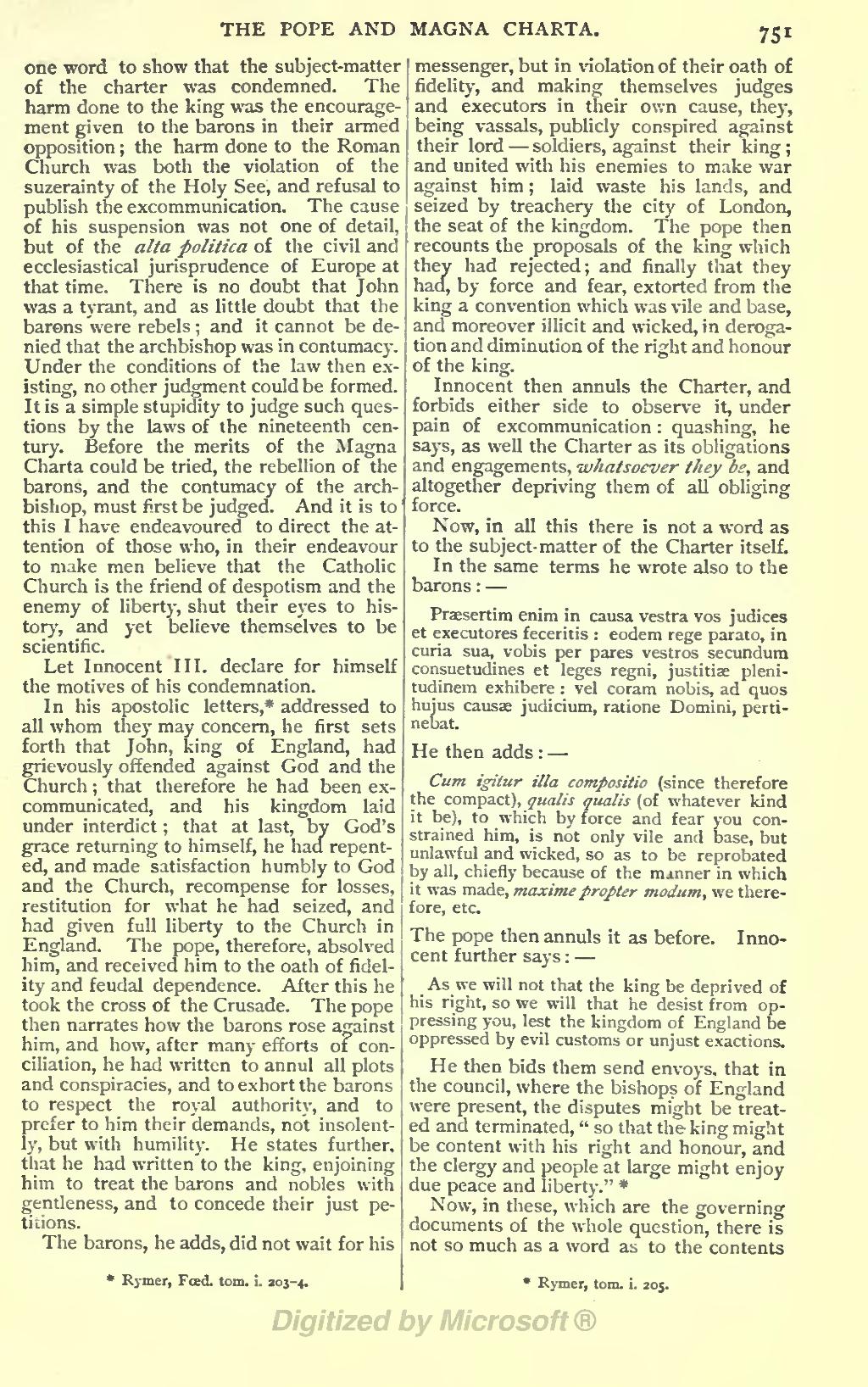one word to show that the subject-matter of the charter was condemned. The harm done to the king was the encouragement given to the barons in their armed opposition; the harm done to the Roman Church was both the violation of the suzerainty of the Holy See, and refusal to publish the excommunication. The cause of his suspension was not one of detail, but of the alta politica of the civil and ecclesiastical jurisprudence of Europe at that time. There is no doubt that John was a tyrant, and as little doubt that the barons were rebels; and it cannot be de- nied that the archbishop was in contumacy. Under the conditions of the law then existing, no other judgment could be formed.
It is a simple stupidity to judge such questions by the laws of the nineteenth century. Before the merits of the Magna Charta could be tried, the rebellion of the barons, and the contumacy of the archbishop, must first be judged. And it is to this I have endeavoured to direct the attention of those who, in their endeavour to make men believe that the Catholic Church is the friend of despotism and the enemy of liberty, shut their eyes to history, and yet believe themselves to be scientific.
Let Innocent III. declare for himself the motives of his condemnation.
In his apostolic letters,[1] addressed to all whom they may concern, he first sets forth that John, king of England, had grievously offended against God and the Church; that therefore he had been excommunicated, and his kingdom laid under interdict; that at last, by God's grace returning to himself, he had repented, and made satisfaction humbly to God and the Church, recompense for losses, restitution for what he had seized, and had given full liberty to the Church in England. The pope, therefore, absolved him, and received him to the oath of fidelity and feudal dependence. After this he took the cross of the Crusade. The pope then narrates how the barons rose against him, and how, after many efforts of conciliation, he had written to annul all plots and conspiracies, and to exhort the barons to respect the royal authority, and to prefer to him their demands, not insolently, but with humility. He states further, that he had written to the king, enjoining him to treat the barons and nobles with due gentleness, and to concede their just petitions.
The barons, he adds, did not wait for his messenger, but in violation of their oath of fidelity, and making themselves judges and executors in their own cause, they, being vassals, publicly conspired against their lord — soldiers, against their king; and united with his enemies to make war against him; laid waste his lands, and seized by treachery the city of London, the seat of the kingdom. The pope then recounts the proposals of the king which they had rejected; and finally that they had, by force and fear, extorted from the king a convention which was vile and base, and moreover illicit and wicked, in derogation and diminution of the right and honour of the king.
Innocent then annuls the Charter, and forbids either side to observe it, under pain of excommunication: quashing, he says, as well the Charter as its obligations and engagements, whatsoever they be, and altogether depriving them of all obliging force.
Now, in all this there is not a word as to the subject-matter of the Charter itself. In the same terms he wrote also to the barons: —
- Præsertim enim in causa vestra vos judices et executores feceritis: eodem rege parato, in curia sua, vobis per pares vestros secundum consuetudines et leges regni, justitiæ plenitudinem exhibere: vel coram nobis, ad quos hujus causæ judicium, ratione Domini, pertinebat.
He then adds: —
- Cum igitur illa compositio (since therefore the compact), qualis qualis (of whatever kind it be), to which by force and fear you constrained him, is not only vile and base, but unlawful and wicked, so as to be reprobated by all, chiefly because of the manner in which it was made, maxime propter modum, we therefore, etc.
The pope then annuls it as before. Innocent further says: —
- As we will not that the king be deprived of his right, so we will that he desist from oppressing you, lest the kingdom of England be oppressed by evil customs or unjust exactions.
He then bids them send envoys, that in the council, where the bishops of England were present, the disputes might be treated and terminated, "so that the king might be content with his right and honour, and the clergy and people at large might enjoy peace and liberty."[2]
Now, in these, which are the governing documents of the whole question, there is not so much as a word as to the contents

